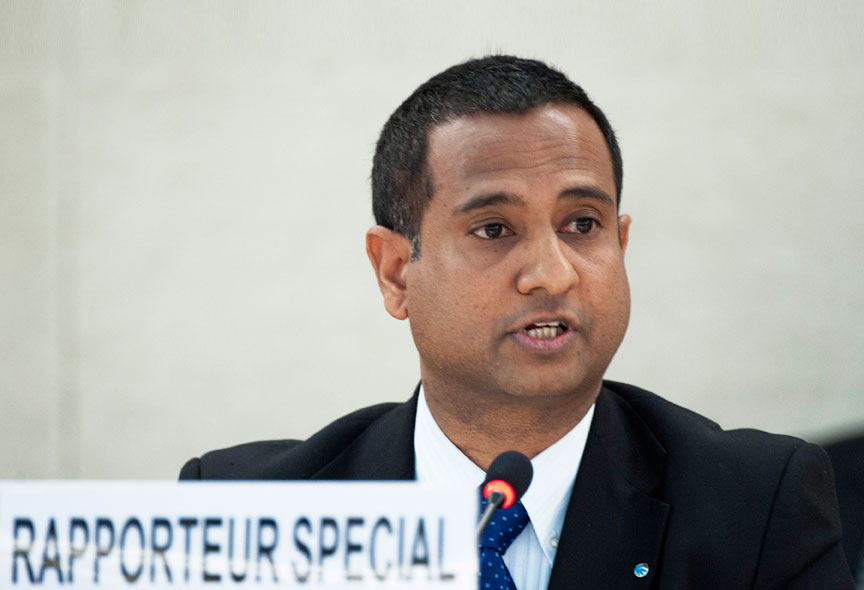November 01-2013
The latest report of the UN Special Rapporteur on human rights in Iran concludes that there is “no sign of improvement” in the Islamic Republic’s adherence to international human rights standards.
The report was issued publicly last week, but was dated October 4 just two months after President Rohani took office and doesn’t distinguish between the old and new administrations.

But the report paints a dark and foreboding picture, accusing the Islamic Republic of “systemic and systematic violations of civil, political, economic, social and cultural rights.”
Ahmad Shaheed, the former foreign minister of the Maldives who is the special rapporteur, acknowledged that his report suffered from holes, writing in the report that “insufficient transparency continues to impede attempts to further ascertain the extent and nature of the country’s human rights situation.”
The Islamic Republic dismissed the report as “flawed” and complained that Shaheed “has not paid sufficient attention to Iran’s legal system and Islamic culture and considers whatever he sees in the West as an international standard for the entire world.”
But Shaheed has noted in previous reports that he is measuring the Islamic Republic against standards that are global in application and are laid out in international agreements of which Iran is signatory.
After Iran denounced the report, Shaheed observed that officials with whom he has met recently had eased away from “denial mode” and acknowledged some human rights problems in Iran. But he said the adamant rejection of his report “fits with a broad pattern” of his receiving positive messages from officials in private without seeing “sufficient change on the ground.”
Shaheed also said in his report that he was “alarmed” by a spate of executions since Rohani was elected. He said they totaled 82.

• “At least 40 journalists, as well as 29 bloggers and online activists, are reportedly serving sentences in the Islamic Republic of Iran…. All 40 journalists currently serving prison sentences were convicted for either national security crimes or crimes of a political nature, with 18 being convicted for “spreading propaganda against the State.”
• “The director of Radio Farda, Ahmad Mostofi, reported that in May 2013 at least nine incidents occurred in which family members of Radio Farda staff were interrogated and pressured to persuade their relatives to cease doing reporting work and, in some cases, to spy on their relatives.”
• “The Special Rapporteur examined a study that investigated access to Persian language articles on the popular open-source encyclopedia, Wikipedia. The study revealed that 964 Persian-language articles on a wide range of topics are effectively blocked in the Islamic Republic of Iran. These and other websites are apparently blocked through the use of either keyword filters that work to impede access based on text in the web address (URL) or by specifically blocking a site. Keyword filtering is also seemingly responsible for restricted access to numerous Wikipedia articles that discuss sexual health, anatomy or bodily functions in a scientific or public health manner, including articles on safe sex and reproductive organs.”
• “It has been estimated that at least 500 human rights defenders are being detained in the Islamic Republic of Iran.”
• “The Special Rapporteur has also received reports about the ongoing detention of at least 30 aid workers allegedly arrested in connection with their work to provide shelter and supplies to victims of the August 2012 earthquake in East Azerbaijan…. At least three of the aid workers were reportedly sentenced to over two years in prison.”
• “The [new] Penal Code continues to consider some ‘crimes’ not meeting the ‘most serious’ standards under international law to be capital offences. These include adultery, drug trafficking, homosexual acts, recidivist alcohol consumption and insulting Islamic prophets…. The Penal Code retains stoning as a method of execution for individuals convicted of adultery, retains amputation and crucifixion for other crimes, such as ‘enmity against God,’ and continues to allow for the execution of juveniles.”
• “Recent reports from former prisoners of Bandar Abbas, Evin, Karoun, Mahabad and Rajai Shahr prisons describe extremely poor conditions for all detainees. Interviewees continue to describe severe overcrowding, limited access to sanitation facilities and medical treatment, inadequate nutritional provisions and insufficient segregation of individuals convicted of violent crimes and those convicted of protected activities or otherwise non-violent acts. For example, it was reported that some prisoners regularly go four to six months without adequate access to fruit, protein and other necessary nutrients and that prisoners in Bandar Abbas prison are now required to buy sugar, protein, dairy foods, eggs, cooking oil and medications, which are reportedly prohibitively expensive for many prisoners.”
• “In 1997, the Human Rights Committee equated flogging, amputation, and stoning with torture…. A report issued by the Iranian Students News Agency (ISNA) stated that 10,814 flogging sentences were implemented in Mazandaran Province alone over the course of eight months in 2012.”
• “At the heart of the deepening human rights crisis in the Islamic Republic of Iran is its disregard for the pre-eminence of rights and standards promulgated by treaties to which it is a party.”
